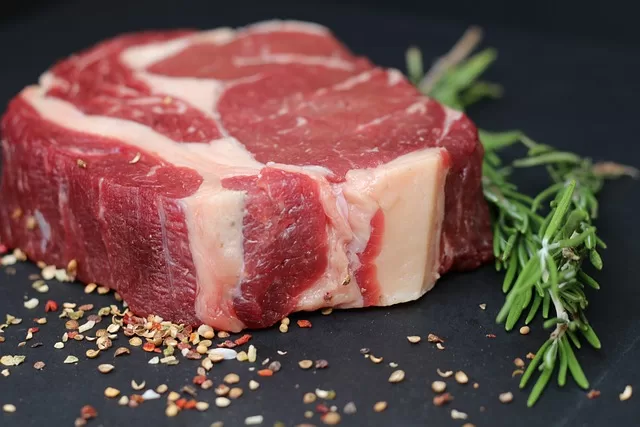Disclaimer: This post contains affiliate links. See our Affiliate Disclosure Statement page for more details.
Table of Contents
6 Scientifically Proven Foods That Can Cause Dog Allergies
Is your Boxer dog scratching excessively, vomiting, or having diarrhea? These could be signs of a food allergy.
Based on data collected from 15 experimental studies from different continents, cited in Food Allergies, A Canine Review, and a veterinary article, Food Allergies in Dogs indicates the top 6 foods causing food allergies in dogs are
- Beef
- Dairy Products
- Wheat
- Lamb
- Chicken Egg
- Soy
The data from these studies showed beef, dairy products, and wheat accounted for 69% of reported cases of adverse food reactions.
Lamb, chicken egg, and soy accounted for 25% of adverse reactions in these studies.
Does this mean that you shouldn’t feed your boxer any products containing these ingredients? Not necessarily, but boxer dog allergies such as skin or gastrointestinal problems, may be caused by one of these culprits.
The only way to find out with some certainty is to do an 8-12-week elimination diet with your boxer. Elimination diets will be discussed in further detail later in this article.
The best way to find out if these products are in your boxer’s food is to look at the product’s ingredient labeling. Ingredients in the product in the highest amounts will be listed first on the label.
Read our related posts
Boxer Dog Food Allergies – What Is A Food Allergy?

According to the National Institute of Allergy, a food allergy is defined as “the clinically abnormal exaggerated immunological reaction/response to the ingested allergen present in food”.
Food allergies are usually associated with an immune response related to the protein component being fed to your dog.
Food allergies show
- No age predisposition
- No sex differences
- No seasonal occurrences
In studies on dogs, German Shepherds and Labradors were found to have the highest incidence of food allergies, however, any breed of dog including mixed dog breeds can be affected by food allergies.
The incidence by age of dog showed
- 33% of dogs less than 1 year old
- 51% of dogs between 1 and 5 years old
- 16% of dogs between 5 and 11 years old
For our boxer dogs’ allergies, we use and recommend
Boxer Dog Food Allergies – How Prevalent Are They?
So, just how prevalent are boxer dog food allergies? Do other dog owners report Boxer allergies?
Well, let’s try to answer these questions.
A Boxer Health Survey 2020, was conducted by boxerbreedcouncil.co.uk, and included 2,865 boxer owners, which represented 3,969 boxers (some had multiple dogs).
The owners were asked how many boxers they owned. The information they provided is listed in the table below.
Number of Respondents | Number of Boxers Owned | Percentage |
2,219 | 1 | 77.5% |
420 | 2 | 14.7% |
107 | 3 | 3.7% |
51 | 4 | 1.8% |
23 | 5 | 0.8% |
45 | 6 | 1.6% |
Data for this table was compiled from Boxer Health Survey – 2020, boxerbreedcouncil.co.uk
What is the sex of the dog?
Number of respondents (n) = 3, 284
- 48.6% male
- 51.4% female
The survey investigated how many of the boxer dogs had specific conditions relating to the following categories
- Breathing problems
- Cancer
- Eye
- Gastrointestinal
- Heart
- Hormonal
- Kidney and Bladder
- Muscle/Bone/Joint
- Neurological
- Skin and/or Coat
The Top 2 categories of specific conditions were
- Skin and/or coat – 31.3%
- Gastrointestinal – 16.1%
- Total – 48.1%
These two categories totaled almost half (48.1%) of all of the specific conditions reported.
The total number of specific conditions reported was 5,025.
The Top 4 Body Systems affected are listed in the table below
Body System | Number Affected | Percentage |
Skin and/or Coat | 1,575 | 31.3% |
Gastrointestinal | 842 | 16.8% |
Muscle/Bone & Joint | 586 | 11.7% |
Eye | 569 | 11.3% |
Data for this table was compiled from Boxer Health Survey – 2020, boxerbreedcouncil.co.uk
When asked if their boxers suffered from gastrointestinal conditions, 2,077 boxer owners reported
- Yes (549 answered) – 27.9%
- No (1,498 answered) – 72.1%
The top 3 most commonly reported conditions reported by the boxer owners were
- Food allergies/intolerance – 21.4%
- Colitis – 15.2%
- Chronic Diarrhea – 12.6%
As you can see from this survey, almost 25% of boxer owners reported boxer dog food allergies.
The two most common types of issues were skin and/or coat and gastrointestinal problems.
This survey provides some insights into the boxer allergies or conditions owners experiences with their boxer dogs.
Read our related posts
For quality pet insurance to help defray the cost of veterinary bills visit Pet Assure.com
What Causes Boxer Dog Food Allergies?

According to veterinarians Dr. Barnett, DVM, and Dr. Ward DVM of Pet Services, VCA Animal Hospitals, in their article Food Allergies in Dogs, a pet allergy occurs when the immune system overreacts and produces antibodies to foods they would usually tolerate.
Different Types of Dog Food Allergies and How They Develop
Food allergies are one of the most common types of allergies in dogs, affecting up to 10% of the canine population. A food allergy occurs when a dog’s immune system overreacts to a particular protein in their food. This can cause a variety of symptoms, including itchy skin, gastrointestinal upset, and respiratory problems.
The most common types of dog food allergies are to:
- Beef
- Chicken
- Dairy
- Eggs
- Soy
- Wheat
However, dogs can be allergic to any protein in their food, including proteins from fish, pork, lamb, and duck.
Food allergies typically develop over time, with repeated exposure to the allergen. The first time a dog eats a food containing the allergen, their immune system will produce antibodies to that allergen. When the dog eats the food again, the antibodies will bind to the allergen and release histamines, which cause the allergic reaction.
The severity of a dog’s food allergy can vary depending on the individual dog and the amount of allergen they are exposed to. Some dogs may have only mild symptoms, while others may have severe reactions that require medical attention.
Identifying and Treating Boxer Dog Food Allergies
The first step in identifying a food allergy in a dog is to rule out other possible causes of the dog’s symptoms. This may involve conducting a food trial, which involves feeding the dog a diet that is restricted to a single protein source and carbohydrate source for 6-8 weeks. If the dog’s symptoms improve on the food trial diet, it is likely that they have a food allergy to one of the proteins or carbohydrates that were excluded from the diet.
Once a food allergy has been identified, the best way to treat it is to avoid feeding the dog the allergen. This may require switching the dog to a hypoallergenic diet or a diet that is restricted to a specific protein source.
If you suspect that your dog may have a food allergy, it is important to talk to your veterinarian.
They can help you to identify the allergen and develop a treatment plan for your dog.
We recommend and get our medications from PetCareRx. They have a great selection and great customer service.
Top Symptoms of Boxer Dog Food Allergies

The symptoms of dog food allergies can vary depending on the individual dog and the severity of the allergy. However, the most common symptoms include:
Skin problems
- Itching
- Redness
- Inflammation
- Rashes
- Hives
- Hair loss
- Licking and chewing of the paws, feet, and/or underarms
Gastrointestinal problems
- Diarrhea
- Vomiting
- Gas
- Abdominal pain
- Blood in the stool
Respiratory problems
- Sneezing
- Coughing
- Wheezing
- Difficulty breathing
Other possible symptoms of dog food allergies include:
- Weight loss
- Lethargy
- Hyperactivity
- Behavioral changes
- Ear infections
How to identify each allergy symptom
- Itching: Dogs with food allergies often itch excessively, especially on their feet, ears, and underarms. You may also notice that your dog is licking and chewing at these areas.
- Redness and inflammation: Red, inflamed skin is another common symptom of food allergies in dogs. The inflammation may be localized to a specific area of the body, or it may be more widespread.
- Rashes and hives: Hives are raised, red bumps that can appear anywhere on the body. Rashes can be red, inflamed, and scaly.
- Hair loss: Hair loss is a common symptom of food allergies in dogs, especially if the allergy is causing chronic itching.
- Licking and chewing of the paws, feet, and/or underarms: Dogs with food allergies often lick and chew at their paws, feet, and/or underarms to relieve the itching. This can lead to hair loss, redness, and inflammation in these areas.
- Diarrhea: Diarrhea is a common symptom of food allergies in dogs. The stool may be loose, watery, and/or bloody.
- Vomiting: Dogs with food allergies may also vomit. The vomit may contain food, bile, or mucous.
- Gas: Dogs with food allergies may experience excessive gas.
- Abdominal pain: Dogs with food allergies may experience abdominal pain. This pain may be mild or severe.
- Blood in the stool: Blood in the stool can be a sign of a serious medical condition, including food allergies. If you see blood in your dog’s stool, it is important to take them to the veterinarian immediately.
- Weight loss: Dogs with food allergies may lose weight, even if they are eating a normal amount of food. This is because their bodies are wasting energy trying to fight off the allergic reaction.
- Lethargy: Dogs with food allergies may be lethargic or tired. This is because their bodies are working hard to fight off the allergic reaction.
- Hyperactivity: Some dogs with food allergies may become hyperactive. This is thought to be a coping mechanism for the discomfort caused by the allergic reaction.
- Behavioral changes: Dogs with food allergies may experience behavioral changes, such as aggression, anxiety, and/or depression.
- Ear infections: Dogs with food allergies are more likely to develop ear infections. This is because the inflammation caused by the allergy can create a moist environment in the ear canal, which is ideal for bacteria and yeast to grow.
If you notice any of these symptoms in your dog, it is important to take them to the veterinarian to rule out other possible causes and to develop a treatment plan.
Are Some Allergens More Likely To Cause Boxer Dog Food Allergies?

Drs. Barnett and Dr. Ward indicate in their article that the most common food allergens causing boxer dog allergies are
- Beef
- Dairy Products
- Lamb
- Chicken
- Chicken Eggs
- Soy
To support these findings, in a scientific review, Food Allergies in Canines, A Review – Journal of Entomology and Zoology Studies, 2017 the authors report the findings on studies relating to dog food allergies.
15 experimental studies with 286 dogs across multiple continents examining ingredients that were commonly associated with food allergies reinforced the VCA article findings showing that
- Beef, Dairy products, and Wheat accounted for 69% of all of the reported food allergy cases
- Lamb, Chicken Egg, and Soy accounted for 25% of all reported allergy cases.
94% of all cases of food allergies in dogs were related to these 6 ingredients.
In another clinical trial, 25 dogs were fed specific food ingredients to determine f they experienced any adverse reactions.
The dogs were fed beef, chicken, chicken eggs, cow’s milk, wheat, soy, and corn.
Among all of the ingredients tested Beef and Soy were found to cause the most skin-related reactions.
All the ingredients caused at least one sign of allergy in at least one dog.
36% of dogs had an allergic reaction to at least one protein but the mean number of suspected food allergens was 2.4 per dog.
Visit JustFoodForDogs and try Fresh food with Novel Proteins such as their Venison and Squash and Fish and Sweet Potato Recipes
Boxer Dog Food Allergies – Elimination Trials
A dog food elimination trial is a process of feeding a dog a restricted diet for a period of time to identify the food or food component that is causing an allergic reaction. This is the most accurate way to diagnose a food allergy in dogs.
How to Conduct a Food Trial
- Choose a novel protein source and carbohydrate source. This means choosing a protein source that your dog has never eaten before, such as venison or rabbit. You should also choose a carbohydrate source that is different from the carbohydrate source in your dog’s current food, such as sweet potato or brown rice.
- Prepare a homemade diet or purchase a commercial hypoallergenic diet. A homemade diet is more likely to be successful, but it can be more time-consuming to prepare. If you choose to prepare a homemade diet, be sure to consult with a veterinarian or certified veterinary nutritionist to ensure that the diet is nutritionally complete and balanced.
- Feed your dog the restricted diet for 6-8 weeks. This is the amount of time it takes for your dog’s immune system to react to the allergen. During this time, your dog should only eat the restricted diet and drink water. Avoid giving your dog any treats, table scraps, or other foods that could contain the allergen.
- Monitor your dog’s symptoms. If your dog’s symptoms improve on the restricted diet, it is likely that they have a food allergy to one of the foods that were excluded from the diet. If your dog’s symptoms do not improve, it is possible that they have a non-food allergy, such as an environmental allergy or a flea allergy.
Once you have completed the food trial, you can start to reintroduce foods one at a time to see which food causes your dog’s symptoms to return. When reintroducing foods, start with a small amount of food and wait 24 hours to see if your dog has any reaction. If your dog does not have any reaction, you can gradually increase the amount of food you feed them. If your dog has a reaction, you know that they are allergic to that food.
Tips for Conducting a Food trial
- Be consistent with the diet. It is important to feed your dog the restricted diet for the full 6-8 weeks, even if their symptoms improve sooner. This will help to ensure that you have accurately identified the allergen.
- Keep a food diary. This will help you to track what your dog is eating and when they are having symptoms.
- Be patient. It can take several weeks to identify the allergen.
If you are unsure about how to conduct a food trial, talk to your veterinarian. They can help you to choose a restricted diet and monitor your dog’s progress.
References:
- Think Your Pet Has a Food Allergy? Eliminating Mistakes in Elimination Diet Trials, Tufts University Clinical Pet Food Service, Petfoodology, Lisa M. Freeman, DVM, PhD, DACVIM (Nutrition), April 4, 2022.
- Identifying food allergies: The veterinary elimination diet trial, DVM360, Judy Seltzer, BVetMed, MRCVS, DACVD, November 6, 2019
Boxer Dogs Food Allergies – How Are They Treated?
Once the offending food ingredient causing the food allergy is identified, a diet is chosen that doesn’t contain any of the ingredients causing the allergy.
A number of commercially available, hypoallergenic dog foods that your boxer will enjoy eating can be purchased to them to prevent allergic food reactions.
The only treatment is to avoid feeding your boxer foods that contain ingredients causing the boxer’s allergies.
In severe cases of allergic food reactions, medications can be given to reduce symptoms.
We recommend Vets Best Seasonal Allergy Soft Chews allergy product from PetCareRx.
Summary
Food Allergies in dogs are one of the 5 most common allergies to affect dogs.
The Top 6 Foods that cause food allergies in dogs are
- Beef
- Dairy Products
- Wheat
- Lamb
- Chicken Egg
- Soy
The only treatment to help boxer dogs with food allergies is to avoid feeding them foods containing the offending ingredient.
A number of commercially available diets are available that can be used to prevent food allergies in your boxer.
We hope this information helps you prevent your boxer from suffering through the symptoms experienced with food allergies.
Frequently Asked Questions
What are the symptoms of Boxer dog food allergies?
The symptoms of Boxer dog food allergies may include skin irritations, itching, redness, rashes, gastrointestinal issues such as vomiting or diarrhea, and in some cases, respiratory problems. If your Boxer exhibits any of these symptoms, it is important to consult with a veterinarian for proper diagnosis and treatment.
What are the causes of Boxer dog food allergies?
Boxer dog food allergies can be caused by a variety of factors, including certain ingredients found in their diet. Common allergens for Boxers include beef, chicken, dairy products, wheat, soy, and artificial additives. Identifying and eliminating these triggering ingredients from their food can help alleviate allergic reactions in Boxer dogs.
How can Boxer dog food allergies be treated?
Treating Boxer dog food allergies typically involves an elimination diet, where potential allergens are removed from their diet and replaced with hypoallergenic alternatives. This process helps identify the specific ingredients causing the allergic reactions. In severe cases, a veterinarian may prescribe medications such as antihistamines or corticosteroids to manage the symptoms. It is crucial to consult with a veterinarian to determine the appropriate treatment plan for your Boxer dog’s food allergies.

Discoverboxerdogs.com are Mary and Chris Kustanbauter. We reside in Red Lion, PA with our two Boxers, Duke and Katie, who are both rescue dogs. We have been working with Adopt A Boxer Rescue for the past 17 years and have adopted 5 Boxers from this fine organization. To learn more visit our Home, Boxer Dog Family, and Blogs Pages Visit us on social media on Facebook – DiscoverBoxerdogs.com


With every thing which seems to be building throughout this particular subject material, many of your perspectives happen to be fairly stimulating. However, I beg your pardon, because I do not subscribe to your whole suggestion, all be it stimulating none the less. It seems to me that your opinions are generally not entirely justified and in fact you are generally yourself not even entirely confident of your argument. In any case I did appreciate looking at it.
Thank you for your comments. I appreciate you taking the time to read the article and provide your perspective.
very nice publish, i actually love this website, keep on it
Thank you very much for following our website. We appreciate your support!
Hi there, You have done an excellent job. I will certainly digg it and in my view recommend to my friends. I am confident they’ll be benefited from this site.
Thank You!
Comments are closed.